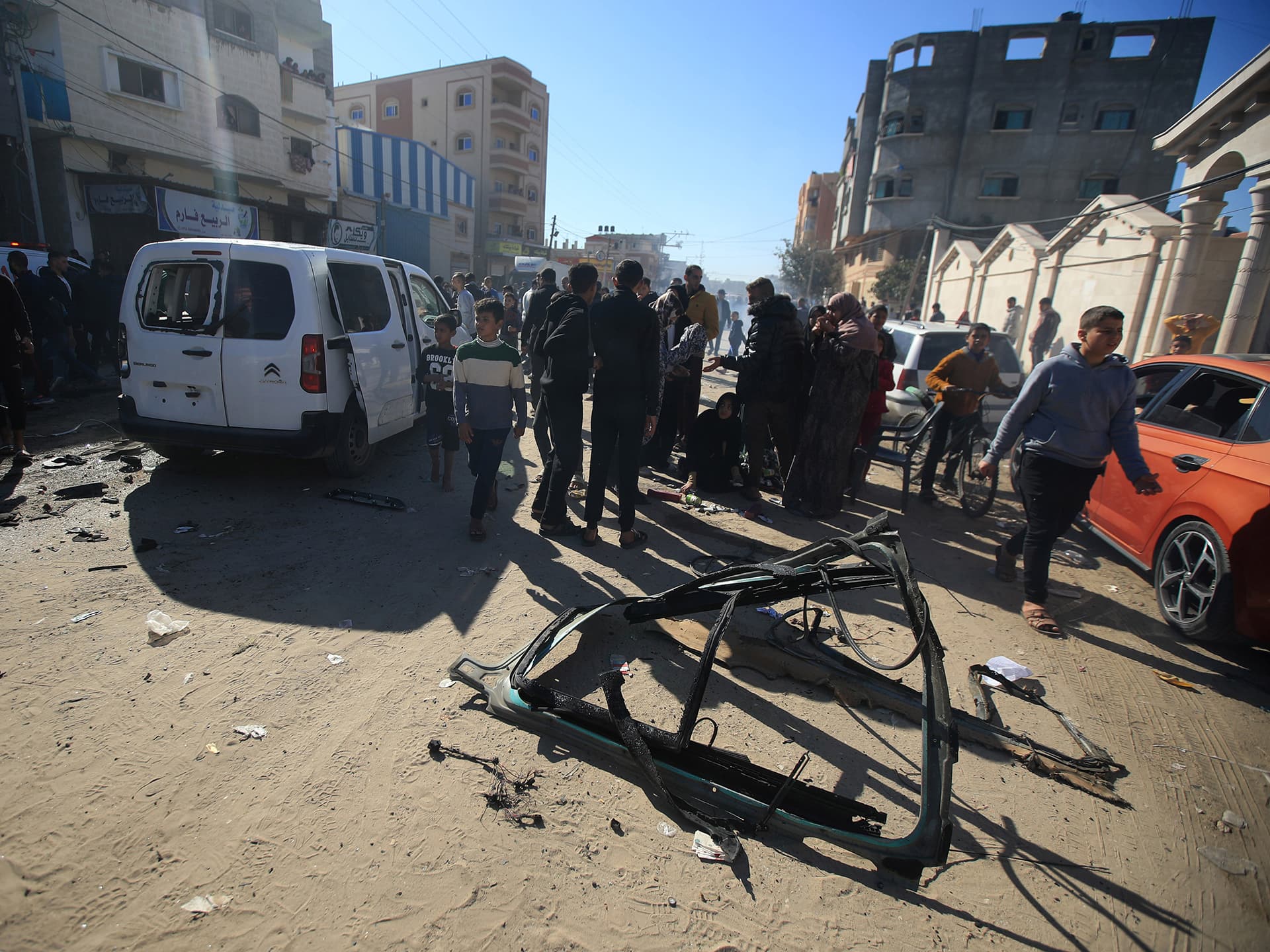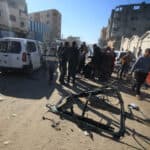
Israel’s Expanding Obligations in Gaza Pursuant to the Law of Occupation
15 February 2024As the hostilities between Israel and armed groups in Gaza persist and the levels of violence in the West Bank, including East Jerusalem, remain high, the Diakonia IHL Centre provides regular updates regarding legal aspects of the evolving situation. This update examines Israel’s expanding obligations pursuant to the law of occupation in Gaza with a focus on the obligation to ensure the adequate supply of crucial goods and resources and the prohibition against the destruction of property.
A full list of legal updates is available here.
The actions of the parties during the first month of the hostilities between Israel and armed groups from Gaza that have been ongoing since 7 October 2023 were examined in detail in a legal brief published by the IHL Centre. Since then, Israeli forces have conducted large-scale ground operations, and now have extensive on-the-ground presence and comprehensive control throughout much of the Gaza Strip. This development impacts the scope and nature of Israel’s legal obligations with respect to Gaza, most notably with regards to its obligations under the law of occupation, the set of IHL provisions that regulate behaviour in occupied territory.
As noted in its aforementioned legal brief and elaborated elsewhere, the IHL Centre, like others (see, e.g., here, here, and here), has taken the view that Israel remains bound by the law of occupation with respect to Gaza as a function of its enduring effective control over the Strip, where and to the extent that it in fact retains such control. Prior to the current hostilities, this control manifested in Israel’s continued capacity to dictate conditions of life in Gaza, primarily through its control over the movement of persons and goods in and out of Gaza, and its related control over Gaza’s supply of crucial resources including food, water, fuel, and electricity. During the present hostilities, Israel has clearly retained these elements of control over Gaza. This was made plainly evident when it significantly reduced the flow of indispensable resources into the Strip, thereby subjecting its population to conditions of extreme deprivation. Moreover, the ground campaign that Israel has been conducting in Gaza since shortly after the outbreak of hostilities in October 2023 has increased the degree of effective control that it wields in the Strip. It now has a military presence in almost all parts of Gaza, and its military has declared that it has “operational control” over many of those areas (see, e.g., here). These ongoing and increasing elements of effective control mean that Israel remains bound by the law of occupation while the hostilities are underway, and that the scope of its obligations under this framework may in fact be expanding.
To be sure, some of the limitations and obligations that an occupying power is ordinarily subject to may apply in a more circumscribed manner while hostilities are ongoing. For one thing, other provisions of IHL that govern the conduct of hostilities now apply alongside the law of occupation. Since they are specifically designed for such purpose, the conduct of hostilities rules are more determinative when it comes to regulating military operations undertaken in hostilities, and certainly with regards to attacks against the opposing belligerent. Accordingly, conduct that would otherwise be prohibited by the law of occupation may be permissible during hostilities. This includes, for example, the intentional killing of certain persons (enemy fighters) even when they do not pose an imminent threat, the intentional destruction of certain objects (military objectives), or the infliction of unintended but foreseeable harm on civilians when not excessive in relation to the military advantage anticipated (see, e.g., here for details on the distinct legal frameworks regulating use of force). Furthermore, many of the duties imposed by the law of occupation are obligations of means (as opposed to results), requiring the occupant to act with due diligence using the means reasonably available to it to discharge the obligation. When hostilities are still raging, the means reasonably available to the occupying power are likely to be limited. Thus, while the occupant has a general obligation to take all the measures in its power to ensure civil life in the occupied territory “as far as possible”, the resources and level of control necessary to facilitate normal conditions of civil life may be unattainable during active hostilities.
Be that as it may, there are strong grounds to conclude that Israel is violating some obligations under the law of occupation that are currently binding upon it with respect to Gaza. Among other things, these include a failure to discharge its duty to ensure that the civilian population is adequately supplied with crucial goods and resources, and a violation of the prohibition on destruction of property in the occupied territory.
Ensuring adequate supply of crucial goods and resources: In addition to its general duty to ensure, as far as possible, civil life in the occupied territory, an occupying power has a specific duty to act, to the fullest extent of the means available to it, to ensure the food and medical supplies of the population. Even before it secured operational control on the ground in Gaza, Israel’s control over access to and from the Strip was such that it had a duty, derived from these provisions of the law of occupation, to do all that it reasonably could do to ensure the supply of crucial goods and resources to Gaza, and to refrain from arbitrarily blocking or interfering with it. Now that Israel has on-the-ground control in addition to the control it exerts over Gaza’s external envelope, its responsibilities in this regard apply a fortiori. Moreover, if the population is inadequately supplied, Israel has an obligation to allow humanitarian relief to reach the population and to facilitate it by all the means at its disposal. While Israel is permitted to take certain measures of control regarding the contents and delivery of humanitarian aid, in so doing it may not unduly delay humanitarian operations, impede their rapid deployment, or make their implementation impossible, and it must provide safe passage to humanitarian personnel and relief (for more on the rules regarding humanitarian access, see here).
Far from discharging its duties with regards to ensuring that the population of Gaza has access to indispensable resources, Israel has intentionally curtailed the flow of such resources into Gaza and within it, even as the destruction wrought by its military campaign has exacerbated the need for humanitarian aid. While Israel has lifted the “complete siege” that it imposed on Gaza at the initial stages of the hostilities and claims that it is not limiting, and is in fact providing humanitarian aid, it has been widely reported that aid relief supplies remain woefully inadequate and are encumbered by access restrictions, onerous coordination requirements, faulty coordination of humanitarian corridors, and other impediments caused by Israel, including attacks that have harmed or endangered humanitarian convoys. As a result, the humanitarian situation in Gaza remains extremely dire with the population reportedly at risk of famine, unable to access lifesaving treatment, and exposed to disease due to a lack of clean water, or adequate sanitation and shelter. The situation is especially dire in the north of the Strip over which Israel has a higher degree of control, and where there are greater barriers to the delivery of humanitarian assistance (see here).
In light of these factors, it may be noteworthy that wilfully impeding relief supplies, or otherwise intentionally using starvation of civilians as a method of warfare by depriving them of objects indispensable to their survival, is a war crime.
Destruction of property: The Israeli military has demolished many structures in parts of Gaza in which it has secured operational control. Such controlled demolitions are subject to the IHL rule that prohibits the destruction or seizure of the property of an adversary, except when required by imperative military necessity. This rule is established in treaty provisions concerning international armed conflict in general and belligerent occupation in particular, and is also recognised as a rule of customary international law. Pursuant to the version of this rule applicable in occupied territory, which is binding upon Israel in Gaza, such destruction of property is permissible only in the narrow circumstances in which it is “rendered absolutely necessary by military operations”. It is highly doubtful that Israel’s extensive destruction of civilian infrastructure in parts of Gaza under its operational control, including the reported destruction of many buildings to create a “buffer zone” along Gaza’s border with Israel, could be justified on the basis of this exacting standard. Significantly, extensive destruction of property in occupied territory that is not justified by military necessity and is carried out unlawfully and wantonly is a grave breach of the Geneva Conventions and, as such, constitutes a war crime.
Header Photo: Rafah, Gaza on January 7th 2024. Photographer: Mohammed Zaanoun/ActiveStills photo collective. All rights reserved.
